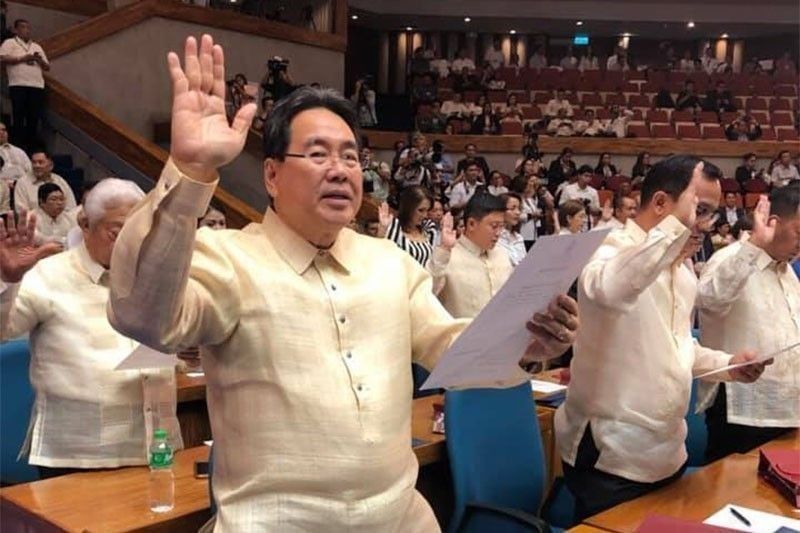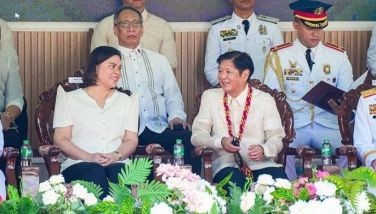No term extension in Cha-cha — lawmaker

MANILA, Philippines — Congressmen are not out to extend their term of office beyond 2022 in their push for Charter change (Cha-cha).
“There is no term extension. Our proposal is to increase the term from three years to five years,” Cagayan de Oro City Rep. Rufus Rodriguez, who chairs the House of Representatives committee on constitutional amendments, told Cignal TV’s “The Chiefs” on Friday.
“We are the only country in the world with three years. The entire Europe and most of the other nations have five years,” he said.
The five-year tenure for congressmen, local officials and senators is one of four constitutional amendment proposals the Rodriguez committee voted to endorse on Wednesday.
The other three are: the insertion of the phrase, “unless otherwise provided by law” in the Charter’s economic provisions, the election of senators by region and the election of the president and vice president as one team.
The sections that would be tweaked are those on land, natural resources, economy, public utilities, mass media, including advertising, and schools.
There would be three senators voted from each of the proposed nine regions, for a total of 27 against the present 24 members of the Senate.
The three-consecutive-term limit would be retained. It would also cover senators.
At present, House members and local officials are restricted to three terms of three years each, for a total of nine consecutive years, while senators are limited to two terms of six years, for a total of 12 years.
Under the longer-term proposal, all lawmakers and local officials could hold office continuously for 15 years.
The president would still have a single term of six years, while there would be no tenure restriction for the vice president.
Interviewed separately on the same show, former elections chief Christian Monsod, one of the framers of the 1987 Constitution, said the present Cha-cha push “is about greed for power and money.”
He claimed there is nothing wrong with the Charter, saying, “All we have to do is implement it.”
Rodriguez said the Cha-cha proposals, assuming the two chambers of Congress approve them as a constituent assembly (con-ass) and the people ratify them in a plebiscite, would take effect after 2022.
“They will not apply to us (incumbent officials),” he said.
House sources told The STAR that some members of the chamber, including one or two congresswomen, were pushing for a term extension, but that the constitutional amendments committee rejected their suggestions.
Rodriguez said the proposed amendment for regional representation in the Senate aims to “promote the development of the regions and the countryside.”
“As of now, there are 12 senators from Metro Manila. The Muslim region is shut out,” he said.
As for the proposal to allow Congress in the future to relax or scrap foreign ownership restrictions, Rodriguez said the goal is for the country to “attract new investors, new companies to set up business here so that the 22 percent of our people who are jobless or under-employed will have job opportunities.”
“In the ASEAN region, we are lagging behind in foreign direct investments. In 2018, Singapore had $50 billion, Vietnam had $24 billion, Malaysia and Indonesia had $15 billion each, while the Philippines had $8 billion,” he stressed.
Former Quezon City congressman and speaker Feliciano Belmonte Jr. had the same economic provision tweaking initiative in previous Congresses.
Monsod expressed doubt on whether foreign investments could make a big impact on economic development.
He said Asia’s economic giants like Singapore and Hong Kong only had two percent to five percent in such investments “during their golden years.” He did not say what would make an economic tiger.
Monsod also claimed that 100-percent foreign ownership of land is allowed by the present Constitution and a Supreme Court ruling.
Besides, Monsod said land ownership is a sensitive issue among poor Filipinos.
“Given our history of feudalism, colonial power and a dictatorship, land is not only an economic commodity, it is a social asset that represents the entry of the poor into the mainstream of society,” he said.
Monsod added the age-old problems of mass poverty and gross inequality between the rich and the poor have persisted “because we have a feudalistic system that has been impervious to change for generations.”
Militant House members also objected to the proposed amendments in the Constitution, particularly on the economic provisions of the Charter.
Bayan Muna Reps. Ferdinand Gaite and Eufemia Cullamat opposed the proposals saying it could have repercussions on the general public.
“We could be bracing ourselves for a tidal wave of onerous contracts similar to or even worse than the now highly publicized scandalous deals with Maynilad and Manila Water,” Gaite said.
Gaite raised concern on the swift approval of proposed constitutional amendment that gives Congress the power to lift restrictions on foreign ownership.
“We’ve already seen the detrimental effects of opening up public service to business interest, and now they want to do it on a grander scale, involving foreign businesses,” he warned.
Cullamat, for her part, assailed the manner by which the panel chaired by Rodriguez approved the proposed amendments.
“I am puzzled why they had to approve the resolution in executive session which does not follow the proper rules. It appears that they really want to railroad this and again have the Filipino people caught off guard,” she said.
“The proposed term extension will just benefit corrupt politicians,” Cullamat lamented.
Senate President Vicente Sotto III earlier said Charter change initiatives are not in the list of priorities of the Senate.
Malacañang, on the other hand, is leaving it up to Congress to decide on the measures to amend the Charter.
Presidential spokesman Salvador Panelo said the executive branch would let the legislators exercise their independence with regard to proposals to revise the Constitution.
“That depends on the members of Congress. The President does not interfere,” Panelo said in an interview with CNN Philippines. – With Edu Punay, Christina Mendez
- Latest
- Trending
































